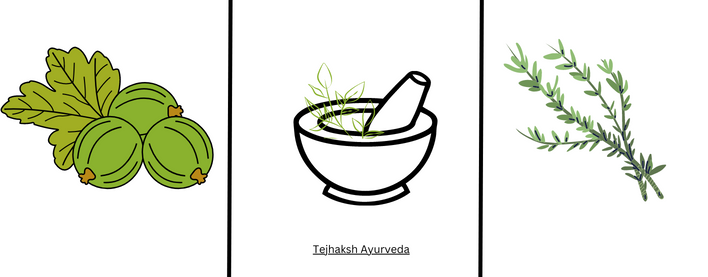Amla, the blessing of Nature (INDIAN GOOSEBERRY)
Indian Gooseberry
AKA Amla
Indian gooseberry, also known as amla, is a fruit that grows
on the Indian gooseberry tree (Emblica officinalis), which is native to India
and other Southeast Asian countries. It is a small, round fruit with a
greenish-yellow color and a tart, sour taste.
Indian gooseberry has been used in traditional Ayurvedic
medicine for centuries for its various health benefits. It is a rich source of
vitamin C and other nutrients, as well as antioxidants and anti-inflammatory
compounds. Indian gooseberry is believed to support immune system function,
digestive health, hair, and skin health, and may help reduce the risk of chronic
diseases such as heart disease and cancer.
Indian gooseberry is commonly consumed in various forms,
such as fresh fruit, juice, or powder, and is often used in traditional Indian
cuisine and Ayurvedic preparations. It is also a popular ingredient in hair and skin care products due to its potential benefits for hair growth and skin
health.
Indian gooseberry is a versatile and nutrient-rich fruit
with a long history of use in traditional medicine and cuisine. It may be a
beneficial addition to a healthy and balanced diet, but it's always important
to consult with a healthcare professional before making any significant dietary
changes or taking supplements.
Why you need
to consume Indian Gooseberry
There
are several reasons why someone might choose to consume Indian gooseberry, also
known as amla:
- Rich in nutrients:
Indian gooseberry is a good source of vitamin C, which is important for
immune system function, skin health, and wound healing. It also contains
other vitamins and minerals, such as iron and calcium.
- Antioxidant properties:
Indian gooseberry is rich in antioxidants, which can help protect cells
from damage caused by free radicals. This may help reduce the risk of
chronic diseases such as heart disease, cancer, and diabetes.
- Anti-inflammatory
properties: Some studies have suggested that Indian gooseberry may have
anti-inflammatory effects, which could help reduce inflammation in the
body and alleviate symptoms of conditions such as arthritis.
- Digestive health:
Indian gooseberry has been used traditionally to support digestive health
and may help alleviate symptoms of digestive issues such as bloating,
constipation, and indigestion.
- Hair and skin health:
Indian gooseberry is often used in hair and skin care products due to its
potential benefits for hair growth and skin health.
consuming
Indian gooseberry may be beneficial for overall health and well-being. However,
as with any supplement or dietary change, it's essential to consult with a
healthcare professional before adding it to your routine.
History in
India as a curing medicine for various diseases
Indian
gooseberry, or amla, has a long history in traditional Indian medicine as a
remedy for various ailments. Ayurvedic medicine has been used for over
3,000 years for its medicinal properties.
According
to Ayurvedic principles, Indian gooseberry is considered a rasayana, which
means it is believed to promote longevity, improve overall health, and increase
vitality. It has been used to treat a wide range of conditions, including respiratory
infections, digestive disorders, skin diseases, and more.
Indian
gooseberry is believed to have anti-inflammatory and antioxidant properties,
which may help reduce the risk of chronic diseases such as heart disease,
diabetes, and cancer. It is also believed to support immune system function and
improve digestion.
In
addition to its traditional uses in medicine, Indian gooseberry is also a
common ingredient in Ayurvedic preparations, such as Chyawanprash, a herbal jam
that is believed to promote overall health and vitality.
While
more research is needed to fully understand the potential health benefits of
Indian gooseberry, its long history of use in traditional medicine is a
testament to its potential therapeutic properties. However, it's always important
to consult with a healthcare professional before using Indian gooseberry or any
other natural remedy to treat a medical condition.
Its
popularity in the west
While
Indian gooseberry has been a staple in traditional Indian medicine and cuisine
for centuries, it is still relatively unknown in the West. However, its
popularity has been slowly growing in recent years as more people become
interested in natural remedies and traditional healing practices.
Indian
gooseberry is now available in various forms, such as capsules, powders, and
juices, and is marketed as a natural supplement for various health concerns. It
is often included in natural and Ayurvedic skincare products, hair care
products, and dietary supplements.
Some
studies have suggested that Indian gooseberry may have potential health
benefits, such as improving immune function and reducing inflammation, which
may contribute to its growing popularity in the West. However, more research is
needed to fully understand its potential therapeutic properties and benefits.
Overall,
Indian gooseberry's popularity in the West is still relatively niche. Still, its potential health benefits and traditional uses make it an interesting natural
remedy for those looking to explore alternative healing practices. As with any
natural supplement or remedy, it's important to consult with a healthcare
professional before use.
The Negative
Side
While
Indian gooseberry, or amla, is generally considered safe for consumption,
consuming too much of it may cause negative side effects in some individuals.
Here are some of the potential negative side effects of consuming too much
Indian gooseberry:
- Upset stomach:
Consuming excessive amounts of Indian gooseberry may cause digestive
symptoms such as nausea, vomiting, and diarrhea.
- Interference with
medications: Indian gooseberry may interact with certain medications, such
as blood thinners and diabetes medications, and interfere with their
effectiveness. It's important to speak with a healthcare professional
before taking Indian gooseberry if you are on any medications.
- Hypoglycemia: Indian
gooseberry may lower blood sugar levels, which could lead to hypoglycemia
in individuals with diabetes or low blood sugar levels.
- Allergic reactions:
Some individuals may be allergic to Indian gooseberry, which could cause
symptoms such as hives, itching, and difficulty breathing.
- Tooth decay: Indian
gooseberry is highly acidic and consuming too much of it may cause tooth
decay and erosion over time.
Overall,
consuming Indian gooseberry in moderation is generally considered safe for most
individuals. However, it's important to speak with a healthcare professional
before taking Indian gooseberry or any other natural supplement, especially if
you have any underlying health conditions or are on any medications.
Why you need
to consume Indian Gooseberry
Indian
gooseberry, or amla, is a nutrient-dense fruit that may offer a range of potential
health benefits. Here are some reasons why someone may consider consuming
Indian gooseberry:
- Rich in vitamin C:
Indian gooseberry is an excellent source of vitamin C, which is important
for immune system function, wound healing, and collagen production.
- Antioxidant properties:
Indian gooseberry contains a range of antioxidants, such as flavonoids and
polyphenols, which may help protect against oxidative stress and reduce
the risk of chronic diseases such as heart disease and cancer.
- Anti-inflammatory
effects: Some studies suggest that Indian gooseberry may have
anti-inflammatory properties, which could help reduce inflammation in the
body and potentially reduce the risk of chronic diseases.
- Digestive health:
Indian gooseberry may help improve digestion and reduce symptoms such as
constipation and bloating.
- Skin and hair health:
Indian gooseberry is commonly used in traditional Ayurvedic preparations
for skin and hair health, and may help improve the appearance of skin and
hair and promote hair growth.
While
more research is needed to fully understand the potential health benefits of
Indian gooseberry, its nutrient density and traditional use in medicine and
cuisine make it a promising natural remedy. However, it's always important to
consult with a healthcare professional before making any significant dietary
changes or taking supplements.
How west
is influenced by the Indian Treatment methods
The
West has become increasingly interested in traditional Indian medicine and
natural remedies, including Indian gooseberry and other Ayurvedic treatments.
This growing interest has led to a rise in the popularity of Ayurveda-based
supplements, skincare products, and other natural remedies in the West.
One
reason for this increased interest is the growing awareness of the potential
risks and side effects associated with pharmaceutical drugs, as well as the
rising interest in holistic and natural approaches to healthcare. As a result,
many people are turning to traditional Indian medicine, including Ayurveda, for
natural and alternative treatment options.
Indian
gooseberry, in particular, has gained popularity in the West as a natural
remedy for a range of health concerns, from immune system support to digestive
health to skin and hair health. Its high vitamin C content and potent
antioxidant and anti-inflammatory properties make it a promising natural remedy
for a variety of conditions.
In
addition to Indian gooseberry, other traditional Indian treatments and
practices, such as yoga and meditation, have also gained popularity in the
West. These practices are often seen as natural and holistic approaches to
promoting overall health and well-being.
Overall,
the West is increasingly influenced by Indian gooseberry and other traditional
Indian treatments, as people seek natural and holistic alternatives to
pharmaceutical drugs and other conventional treatments. While more research is
needed to fully understand the potential health benefits of these traditional
treatments, their long history of use in Ayurvedic medicine is a testament to
their potential therapeutic properties.
How and why
earlier people in history used to believe in Indian gooseberry
The West has
become increasingly interested in traditional Indian medicine and natural
remedies, including Indian gooseberry and other Ayurvedic treatments. This
growing interest has led to a rise in the popularity of Ayurveda-based supplements,
skincare products, and other natural remedies in the West.
One reason
for this increased interest is the growing awareness of the potential risks and
side effects associated with pharmaceutical drugs, as well as the rising
interest in holistic and natural approaches to healthcare. As a result, many
people are turning to traditional Indian medicine, including Ayurveda, for
natural and alternative treatment options.
Indian
gooseberry, in particular, has gained popularity in the West as a natural
remedy for a range of health concerns, from immune system support to digestive
health to skin and hair health. Its high vitamin C content and potent
antioxidant and anti-inflammatory properties make it a promising natural remedy
for a variety of conditions.
In addition
to Indian gooseberry, other traditional Indian treatments and practices, such
as yoga and meditation, have also gained popularity in the West. These
practices are often seen as natural and holistic approaches to promoting
overall health and well-being.
Overall, the
West is increasingly influenced by Indian gooseberry and other traditional
Indian treatments, as people seek natural and holistic alternatives to
pharmaceutical drugs and other conventional treatments. While more research is
needed to fully understand the potential health benefits of these traditional
treatments, their long history of use in Ayurvedic medicine is a testament to
their potential therapeutic properties.
Conclusion
Indian
gooseberry, also known as amla, has a long and respected history of use in
traditional Indian medicine, or Ayurveda. It is a nutrient-dense fruit that is
rich in vitamin C and contains a range of antioxidants and anti-inflammatory
compounds. Indian gooseberry has gained popularity in the West as a natural
remedy for a variety of health concerns, from immune system support to
digestive health to skin and hair health. Older people in history may have
believed in the Indian gooseberry treatment due to its long history of use and
potential therapeutic properties. While more research is needed to fully
understand the potential health benefits of Indian gooseberry, its nutrient
density and traditional use in medicine and cuisine make it a promising natural
remedy. It is important to consult with a healthcare professional before making
any significant dietary changes or taking supplements.






.jpg)


.jpg)





.png)

